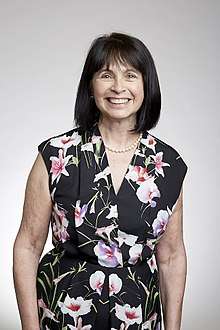Susan R. Wessler
Susan Randi Wessler (born 1953, New York City), ForMemRS, is an American plant molecular biologist and geneticist.[2][3][4] She is Distinguished Professor of Genetics at the University of California, Riverside (UCR).[5][6][7][8]
Susan Wessler | |
|---|---|
 Susan Wessler at the Royal Society admissions day in London, July 2017 | |
| Born | Susan Randi Wessler 1953 (age 66–67) |
| Alma mater |
|
| Awards | ForMemRS[1] |
| Scientific career | |
| Institutions | |
| Thesis | In vitro and in vivo expression of the leucine operon of Escherichia coli and Salmonella typhimurium (1980) |
| Website | wesslerlab |
Education
Wessler graduated from the Bronx High School of Science in 1970.[9] She received her bachelor's degree in 1974 in Biology from the State University of New York at Stony Brook and her Ph.D. in Biochemistry from Cornell University in 1980.[9]
Career and research
She was a postdoctoral research fellow at the Carnegie Institution of Washington in the Department of Embryology from 1980-1982.[9] She joined the faculty at University of Georgia (UGA) in 1983 as an assistant professor of botany becoming a full professor in 1992.[9] She was named Distinguished Research Professor in 1994 and Regents Professor in 2005.[9]
In 2006, Professor Wessler was named a Howard Hughes Medical Institute (HHMI) Professor.[10][9] She is also a professor at large at the Keck Graduate Institute at the Claremont Colleges in Claremont, California.[11]
Her research[5] focuses on identifying plant transposable elements and determining how they contribute to gene and genome evolution.[9][6][7] Her work has deciphered how transposable elements generate genetic diversity and attain high copy numbers without killing their host.[1] Her laboratory demonstrated that elements could function as introns and that retrotransposons are the major cause of spontaneous insertion mutations in maize. In the genomics era her laboratory pioneered the computational analysis of transposable elements, culminating in the discovery of miniature inverted repeat transposable elements (MITEs), the element most frequently associated with plant genes.[1] As a Howard Hughes Medical Institute (HHMI) Professor, Wessler adapted her research program for the classroom by developing the Dynamic Genome Program where incoming freshmen experience the excitement of scientific discovery.[1][12]
Awards and honors
- Elected a Foreign Member of the Royal Society (ForMemRS) in 2017[1]
- Elected member, American Philosophical Society (2013)
- Elected member, National Academy of Sciences (1998)[13]
- Councilor, National Academy of Sciences (2004) and Home Secretary (2011)[9]
- Elected fellow, American Association for the Advancement of Science (2006)[13]
- Elected fellow, American Academy of Arts and Sciences (2007)[13]
- American Society of Plant Biologists' Stephen Hales prize (2011)[14]
- FASEB Excellence in Science Award (2012)
- McClintock Prize for Plant Genetics and Genome Studies (2015)
References
- Anon (2017). "Professor Susan Wessler ForMemRS". royalsociety.org. Royal Society. Archived from the original on 2017-05-11. One or more of the preceding sentences incorporates text from the royalsociety.org website where:
“All text published under the heading 'Biography' on Fellow profile pages is available under Creative Commons Attribution 4.0 International License.” --"Royal Society Terms, conditions and policies". Archived from the original on 2016-11-11. Retrieved 2016-03-09.CS1 maint: BOT: original-url status unknown (link)
- "UGA Plant Biology Department Biography of Wessler". plantbio.uga.edu. Archived from the original on 2006-09-01.
- "UGA Genetics Adjunct Faculty biography of wessler". genetics.uga.edu. Archived from the original on 2006-09-01.
- "National Academy of Sciences interview with Susan Wessler". nasonline.org. Archived from the original on 2006-05-28.
- Susan R. Wessler publications indexed by the Scopus bibliographic database. (subscription required)
- Tuskan, G. A.; Difazio, S.; Jansson, S.; Bohlmann, J.; Grigoriev, I.; Hellsten, U.; Putnam, N.; Ralph, S.; Rombauts, S. (2006). "The genome of black cottonwood, Populus trichocarpa (Torr. & Gray)". Science. 313 (5793): 1596–1604. Bibcode:2006Sci...313.1596T. doi:10.1126/science.1128691. ISSN 1095-9203. PMID 16973872. (subscription required)
- Schnable, Patrick S.; Ware, Doreen; Fulton, Robert S.; Stein, Joshua C.; Wei, Fusheng; Pasternak, Shiran; Liang, Chengzhi; Zhang, Jianwei; Fulton, Lucinda (2009). "The B73 maize genome: complexity, diversity, and dynamics". Science. 326 (5956): 1112–1115. Bibcode:2009Sci...326.1112S. doi:10.1126/science.1178534. ISSN 1095-9203. PMID 19965430. (subscription required)
- Chen, Jinfeng; Wrightsman, Travis R.; Wessler, Susan R.; Stajich, Jason E. (2017). "RelocaTE2: a high resolution transposable element insertion site mapping tool for population resequencing". PeerJ. 5: e2942. doi:10.7717/peerj.2942. PMC 5274521. PMID 28149701.

- "Susan R. Wessler '70 Elected Home Secretary of Prestigious national Academy of Science," The Bronx High School of Science Alumni News, Summer 2011, pp. 1, 5.
- "Susan Wessler at HHMI". Howard Hughes Medical Institute.
- "Keck Graduate Institute website Adjunct Faculty page". Archived from the original on 2011-06-02. . Accessed June 22, 2011.
- "Susan Wessler's Seminar: "The Dynamic Genome"".
- "Center for Plant Cell Biology: Members". cepceb.ucr.edu.
- "ASPB names 2011 award recipients" (PDF). Archived from the original (PDF) on August 16, 2011. Retrieved July 20, 2012.